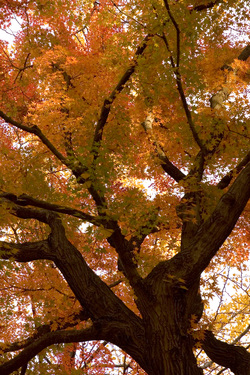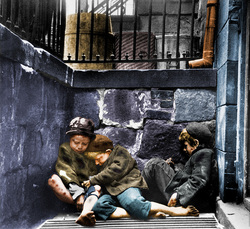 March, 2014 The property next door is set for demolition and redeveloping. The developer came to our door with a question that sent my head spinning. “Would it be alright with you if we cut down that tree?” “Say again?” “We want to build a two-car garage, and it would make things so much easier if we could remove it.” The maple tree he was pointing to is at least 75 years old and borders the two lots, so anyone would rightfully have to get our permission to cut it down. Nice of him to ask. My reaction was visceral – the gall. This shared tree is our only tree. Our kids play in the dappled light it casts over our yard and on our wood floors. On a warm summer day, the shade protects us from overheating. A slight breeze will cause a rustling and shimmering of light that is absolutely transcendent. Our maple tree, a conveyor of happiness, comfort and inspiration - the developer wanted it out of his way? I guess I shouldn’t have expected a stranger to understand, but I was incensed at the callousness of his suggestion. I confess my verbal outpouring was not very Christian. But he was relentless (he must get this all the time), trying to explain to me that a new tree would be planted in its place, of course. At that point I couldn’t hold my laughter. We thought the message – over my dead body! – had gotten through until the excavators arrived a couple weeks later, drawings in hand, and showed us, upon our request, the plans for development. They pointed to the locations of three existing trees they planned to remove, including the aforementioned object of our affections! My blood boiled again, and the excavators seemed puzzled. I called the city. No permit had been issued for the tree’s removal, and they would inform us if such an application arrived on their desk. A few days later, in a conversation with a real estate friend, he told us that some developers simply take a tree down without a permit and then pay the fine and ask forgiveness later. Praying with vague hope, I made a sign, “Do Not Damage or Remove This Tree," then added the ominous but obscure line, "Don't Wait for Forgiveness.” and then strung it up around the breast of the tree like a placard. The end of the story is still to be written, but as the saga of the maple has gone, I’m anxious about who will be writing the final chapter. I’ve come to feel caught in a cosmic battle between the forces of good and evil, with us as the guardians and the developers as the destroyers. The tree has become a symbol of helpless innocence, of purity, of God’s generosity and grace. It is not only the biosphere and carbon depletion that are at stake, though that would be enough, but the very heart of God and his love for the world were being defiled. Would it be a stretch to call our maple tree a sacrament? I don’t think so. We often assume the only sacraments are those we go to church for on Sunday morning. But I believe we are surrounded unawares by sacraments like this every day, not just as static symbols, but as means to apprehend God and as invitations to participate in his work. In fact, one could argue that the tree was among the first sacraments God gave us: The Tree of Life (Gen. 2), by which we were to draw life from God and know him. I am fearful, however. I understand how fragile these sacraments can be in a broken, self-serving world. They can be cut out of our lives with the brief hum of a chain saw, just as easily as hope can be nailed to a tree and die. To be sure, even in death we can learn of God’s grace. But I’m not ready to see that part of the story played out in our own back yard. I should prepare myself for the worst, I know, because life can be so easily snuffed out. This season, I am making the story of our maple tree my lent, waiting on God, trying to hear what he’s saying and see what he’s doing.
0 Comments
 February, 2014 I used to fast on a semi-regular basis. That was when I was younger and more zealous in my faith. So, why did I quit? Other concerns took over, I guess. Job and career, and now a family to care for. It would be not only incorrect but blasphemous of me to say fasting is a luxury now. From my memory, it's anything but a luxury. It's inconvenient and unproductive, which is probably the biggest reason I and most people don't do it. Also, there's nothing fast about fasting. It's a discipline that requires lots of patience, and the benefits are often not obvious. The forty days before Easter in the Christian calendar are normally referred to as "lent," a time for fasting, self-reflection and assessment, a preparation for receiving the sacrifice of Jesus and his victory over pain and death. A recent message at my church on Psalm 6 made me think more about fasting again. The pastor never mentioned fasting, but I caught a sense of it from what he and the text were saying. I don't normally engage in exegesis, but as I looked over Psalm 6, I saw the journey of the writer (presumed King David) that seemed to be a microcosm of a greater narrative of faith. It's only a short 20-line poem (see text below), but it expresses the scope of the biblical narrative from fall to redemption to restoration. First, David agonizes with God, pleading with him not to discipline him. We're not sure what kind of anguish he was in, but the threat is so severe it feels like he may die. It's very reminiscent of Jesus in Gethsemane. Then David rationalizes with God, arguing that he would be no good to God as a dead man. How would he be able to praise him before his people? There might even be a hint of manipulation in his argument, but hey, who am I to judge. When you're desperate, you try anything. This is raw human agony. David hasn't stopped crying day and night. He complains how his enemies, real or imagined, are getting the best of him. And this brief Psalm ends on a triumphant note, declaring David's confidence in how God has heard his pleadings and delivered him from his enemies. Then it struck me that in essence this is what fasting, at least in part, is about. When I was in the middle of a fast, I remember groaning and feeling like I was wasting away. I remember thinking, when the hunger pangs intensified, that I didn't want God's discipline. I can remember bargaining, with myself and God, that I wasn't doing my family, my students, or God any good in a condition of weakness, headaches and grumpiness. I couldn't work efficiently, much less feel grateful to God. And then, after I had broken fast, I remember feeling the triumph: relief from my agony and restoration to my original state. What I perhaps more aptly appreciate now is that fasting and lent is not simply navel gazing. It's also not only about me and God and about toughening up my faith. It is certainly about drawing my focus to God, on whom I depend completely for life. But that's not all. Fasting is also a way of participating in King David's agony, and in the agony of the world. As a king, David had to bear the burdens of his people and his kingdom. I also am called to participate in the brokenness and suffering of creation, of mankind, of my friends and community, and then bring us all before God our provider, healer, and restorer. As such, I am truly being faithful to Jesus, foreshadowed by King David and remembered in lent. For ultimately Jesus in his sufferings took on the agony of his creation, of us all. And finally, as Isaiah 58 puts it, for my fasting to be complete it should motivate me to "loose the chains of justice" and "set the oppressed free." I think I'll give fasting another try, but with a greater purpose in mind. Psalm 6 1 Lord, do not rebuke me in your anger or discipline me in your wrath. 2 Have mercy on me, Lord, for I am faint; heal me, Lord, for my bones are in agony. 3 My soul is in deep anguish. How long, Lord, how long? 4 Turn, Lord, and deliver me; save me because of your unfailing love. 5 Among the dead no one proclaims your name. Who praises you from the grave? 6 I am worn out from my groaning. All night long I flood my bed with weeping and drench my couch with tears. 7 My eyes grow weak with sorrow; they fail because of all my foes. 8 Away from me, all you who do evil, for the Lord has heard my weeping. 9 The Lord has heard my cry for mercy; the Lord accepts my prayer. 10 All my enemies will be overwhelmed with shame and anguish; they will turn back and suddenly be put to shame. |
Archives
January 2024
Categories |
 RSS Feed
RSS Feed